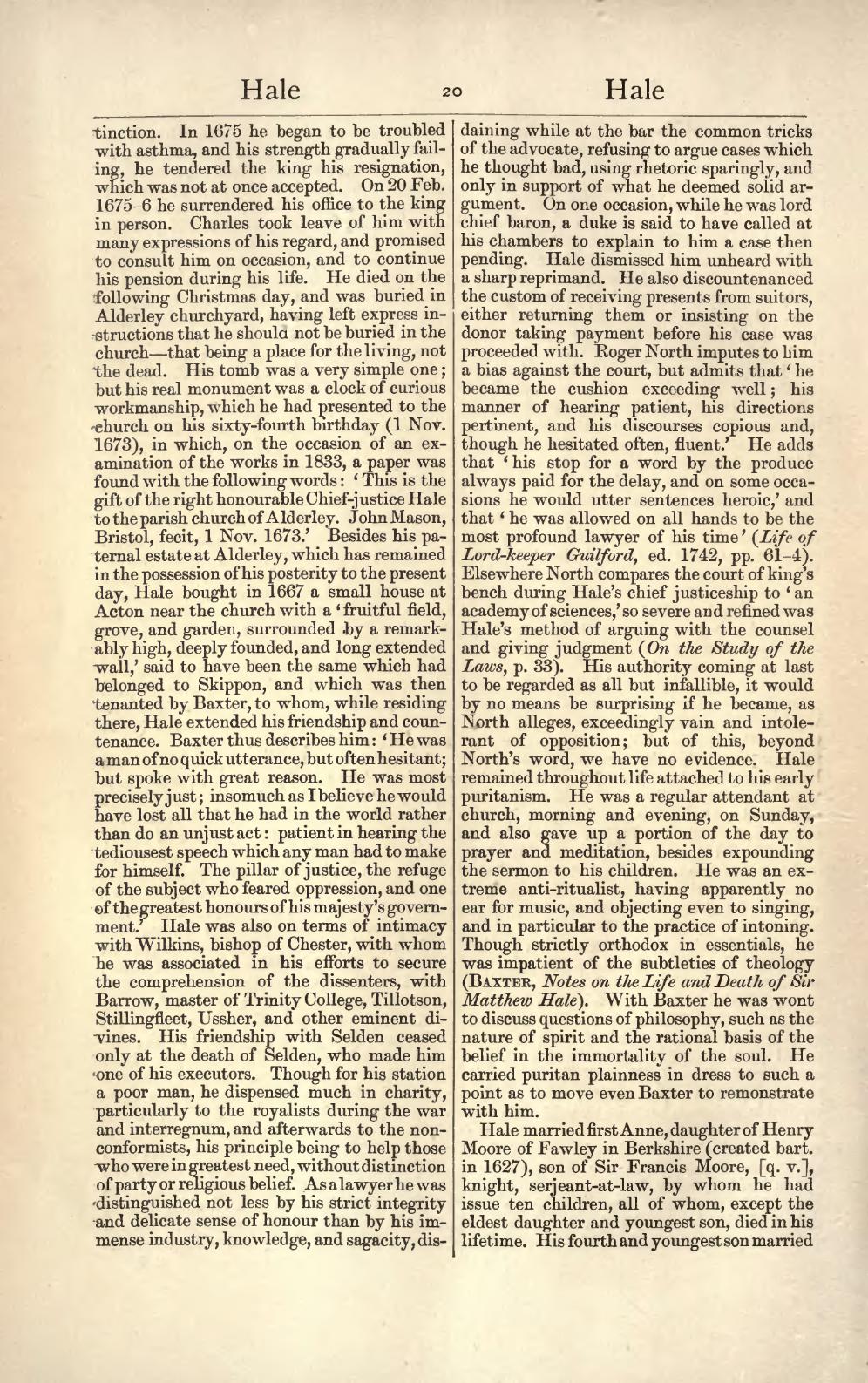tinction. In 1675 he began to be troubled with asthma, and his strength gradually failing, he tendered the king his resignation, which was not at once accepted. On 20 Feb. 1675-6 he surrendered his office to the king in person. Charles took leave of him with many expressions of his regard, and promised to consult him on occasion, and to continue his pension during his life. He died on the following Christmas day, and was buried in Alderley churchyard, having left express instructions that he should not be buried in the church—that being a place for the living, not the dead. His tomb was a very simple one; but his real monument was a clock of curious workmanship, which he had presented to the church on his sixty-fourth birthday (1 Nov. 1673), in which, on the occasion of an examination of the works in 1833, a paper was found with the following words: 'This is the gift of the right honourable Chief-justice Hale to the parish church of Alderley. John Mason, Bristol, fecit, 1 Nov. 1673.' Besides his paternal estate at Alderley, which has remained in the possession of his posterity to the present day, Hale bought in 1667 a small house at Acton near the church with a 'fruitful field, grove, and garden, surrounded .by a remarkably high, deeply founded, and long extended wall,' said to have been the same which had belonged to Skippon, and which was then tenanted by Baxter, to whom, while residing there, Hale extended his friendship and countenance. Baxter thus describes him: 'He was a man of no quick utterance, but often hesitant; but spoke with great reason. He was most precisely just; insomuch as I believe he would have lost all that he had in the world rather than do an unjust act: patient in hearing the tediousest speech which any man had to make for himself. The pillar of justice, the refuge of the subject who feared oppression, and one of the greatest honours of his majesty's government.' Hale was also on terms of intimacy with Wilkins, bishop of Chester, with whom he was associated in his efforts to secure the comprehension of the dissenters, with Barrow, master of Trinity College, Tillotson, Stillingfleet, Ussher, and other eminent divines. His friendship with Selden ceased only at the death of Selden, who made him one of his executors. Though for his station a poor man, he dispensed much in charity, particularly to the royalists during the war and interregnum, and afterwards to the nonconformists, his principle being to help those who were in greatest need, without distinction of party or religious belief. As a lawyer he was distinguished not less by his strict integrity and delicate sense of honour than by his immense industry, knowledge, and sagacity, disdaining while at the bar the common tricks of the advocate, refusing to argue cases which he thought bad, using rhetoric sparingly, and only in support of what he deemed solid argument. On one occasion, while he was lord chief baron, a duke is said to have called at his chambers to explain to him a case then pending. Hale dismissed him unheard with a sharp reprimand. He also discountenanced the custom of receiving presents from suitors, either returning them or insisting on the donor taking payment before his case was proceeded with. Roger North imputes to him a bias against the court, but admits that 'he became the cushion exceeding well; his manner of hearing patient, his directions pertinent, and his discourses copious and, though he hesitated often, fluent.' He adds that 'his stop for a word by the produce always paid for the delay, and on some occasions he would utter sentences heroic,' and that 'he was allowed on all hands to be the most profound lawyer of his time' (Life of Lord-keeper Guilford, ed. 1742, pp. 61-4). Elsewhere North compares the court of king's bench during Hale's chief justiceship to 'an academy of sciences,' so severe and refined was Hale's method of arguing with the counsel and giving judgment (On the Study of the Laws, p. 33). His authority coming at last to be regarded as all but infallible, it would by no means be surprising if he became, as North alleges, exceedingly vain and intolerant of opposition; but of this, beyond North's word, we have no evidence. Hale remained throughout life attached to his early puritanism. He was a regular attendant at church, morning and evening, on Sunday, and also gave up a portion of the day to prayer and meditation, besides expounding the sermon to his children. He was an extreme anti-ritualist, having apparently no ear for music, and objecting even to singing, and in particular to the practice of intoning. Though strictly orthodox in essentials, he was impatient of the subtleties of theology (Baxter, Notes on the Life and Death of Sir Matthew Hale). With Baxter he was wont to discuss questions of philosophy, such as the nature of spirit and the rational basis of the belief in the immortality of the soul. He carried puritan plainness in dress to such a point as to move even Baxter to remonstrate with him.
Hale married first Anne, daughter of Henry Moore of Fawley in Berkshire (created bart. in 1627), son of Sir Francis Moore, [q. v.], knight, serjeant-at-law, by whom he had issue ten children, all of whom, except the eldest daughter and youngest son, died in his lifetime. His fourth and youngest son married
